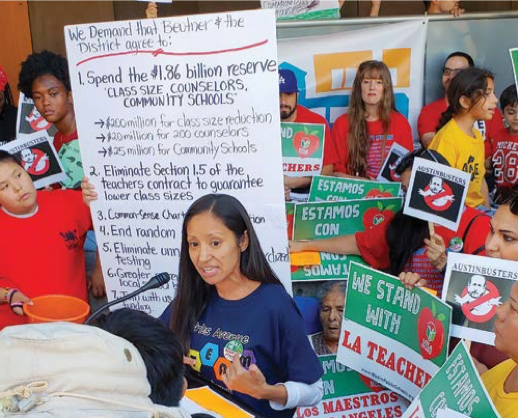It’s Thursday afternoon in early January 2019, the day after the United Teachers of Los Angeles (UTLA) went out on strike. Parent leaders who had been organizing with the Alliance of Californians for Community Empowerment (ACCE), gathered at the UTLA offices for a Strike School, a training series designed to build deeper solidarity between parents, teachers and students. The Strike School was intended to use the political opening of the strike to help parents dig deeper into the processes that drove public education into the ground in order to understand the systemic forces that were at work.
We dug into the ways in which the wealthy few have systematically worked to rebuild our government and economy in their interests, in other words: to understand the political project that we often call “neoliberalism.” As we walked through a gallery with images representing the different aspects of the neoliberal agenda – from corporate power to cutback to crackdowns – the parent leaders started to bring the different threads together. Drawing connections between privatization and cutting taxes, the parents said things like, “It’s a set-up. First, they cut taxes, and then they say there’s not enough money. So then our schools start to go downhill. They use that as an excuse to privatize and to push charter schools on us. And then they use the charter schools to argue for even more cuts.” Seeing the connections between increased policing and cuts to social services, they commented that, “They cut the nurses and libraries, and then they say they need to send the police in to manage our students.” Finally, as we discussed the attacks on unions and cuts to services, the parents saw how this was a collective fight: “They are blaming all of us for these problems. They say teachers and the union are the problem. Then they say that students are the problem, and they blame the parents for that. But the real problem is the fact that they’ve taken away the resources we need to make public schools work.”
The parents brought the deep wisdom that comes from their experience as poor and working people in this country; they know the neoliberal agenda in their bones, because they live it every day. But it took creating a space where they could step back and analyze the different aspects of their experience in one place to bring the pieces together. All of these issues weren’t just “happening” to them. In fact, a small group of incredibly wealthy people aimed to set things up this way. The parents left with a deeper sense that we all need each other if we are going to take on the wealthy few. We need each other not only in this particular strike, but also to take back our economy and government. They left the Strike School even more fired up than they had come into it. They took these frameworks to the streets that week, bringing them to their speeches at actions and on picket lines and back to their communities for the long haul.
The success banks, finance and giant corporations have had extracting giant subsidies from our government while laying off their own workers created the conditions for the fights in St. Paul, MN, Chicago, IL and Los Angeles, which led to Bargaining for the Common Good (BCG) and #RedforEd. These movements have also illustrated why political education is so important – it helps all of us understand how the rich and powerful operate, creating the shared analysis that enables us to fight and win together.
The Role of Popular Education in Bargaining for the Common Good
We live in a country where our unions and community organizations are driven – by law and by habit – into functioning as discreet interest groups that compete with each other for pieces of a pie that is shrinking before our eyes. Bargaining for the Common Good is designed as a strategy to help unions and community organizations to dig deeply into how to overcome those limits. Popular education can be an effective tool in that process, serving many roles at once:
-
Popular education provides a space where our members, leaders and staff can come together across organizational lines and perceived interests to make sense of the connections between their different lived experiences. We saw this many years ago in Minnesota, when the seeds that would flower into a Bargaining for the Common Good approach were being planted. In 2013, members of the St. Paul Federation of Educators (SPFE) came together with students and parents for a deep process of education and reflection through which they developed a visionary narrative about “The Schools St. Paul Students Deserve.” This transformed their future bargaining campaigns to incorporate issues like smaller class sizes, expanding school services like nurses and libraries and convincing the school district to stop doing business with banks that foreclosed on families during the school year.
-
Popular education helps us to develop clarity about our shared enemy, a crucial aspect of building meaningful solidarity and a key element of Bargaining for the Common Good work. This understanding of ”shared enemy” can manifest on several different levels:
-
At the most straightforward level, it can enable our members and leaders to recognize the corporate actors who are profiteering off our backs in a given industry or geography. For example, a ground-breaking alignment of unions and community organizations based in the Twin Cities identified the twelve leading corporate actors who shaped the political and economic terrain of Minnesota, calling them the “Dirty Dozen.” Clarity about their shared corporate enemies helped to bind together their alignment and to pioneer successful joint labor-community bargaining. This work started with the Target Corporation, winning stronger contracts for unionized janitors in Target’s office buildings, unionization for in-store janitors and “banning the box” that limited previously incarcerated people’s ability to get jobs at Target. In our current crisis, popular education at this level of analysis would help us dig into the role of the corporations and financial actors that are already planning to profit from this pandemic.
-
Second, popular education can help us identify the larger agenda of our shared enemy in the current period. This is reflected in the story of the UTLA strike above, when parents built on their knowledge of bad corporate actors to come to understand the impact of neoliberalism on public education in California. Understanding “financialization” is another example of this level of analysis: it helps us to see the economic structures which give big finance power over almost every aspect of our lives today. Applying this to the COVID epidemic, we would explore the ways in which the austerity agenda of neoliberalism decimated the safety net and the public health infrastructure we need to survive this crisis as a society – and to envision the organizing and movement project we all have to collectively rebuild.
-
Finally, popular education can help us dig even deeper, into more systemic levels of analysis. We have found popular education on the framework of “racial capitalism” to be especially helpful for understanding the world in which we live. It helps to explain the ways in which our economic system is inseparable from racial stratification and division, so that we can find a deeper sense of “shared enemy “ and “shared interest” that acknowledges our differences while also building solidarity. Applying the approach at this level of analysis to help us understand the coronavirus epidemic, we would focus on holding our shared interests as poor and working people and the ways in which historically constructed racial, gender and other inequalities will make this crisis hit communities of color and women the hardest.
-
-
Finally, popular education provides a space to democratize the strategic thinking behind Bargaining for the Common Good, engaging our members and leaders in the process of identifying our shared agenda and exercising our shared power. One example of this was a group exercise at the Leadership School in Minnesota during the February-March 2020 week of strikes and community mobilizations. During this School, we ran a delegation simulation where member-leaders planned an imaginary action on a real estate CEO to unite demands around climate, tenants’ and workers’ issues which mirrored the wave of actions they were participating in during the week. Because member-leaders were the people who were conceptualizing the action, they left with a deeper strategic sense of the logic behind the week of actions in which they were engaged, rather than just showing up as participants.
Popular education is one of the many tools in the belt of the Bargaining for the Common Good movement and framework, drawing on the immediate struggles around which community and union members are organized and using them as entry points to draw out deeper understandings of the nature of the society within which we live and the need to build shared struggle.


